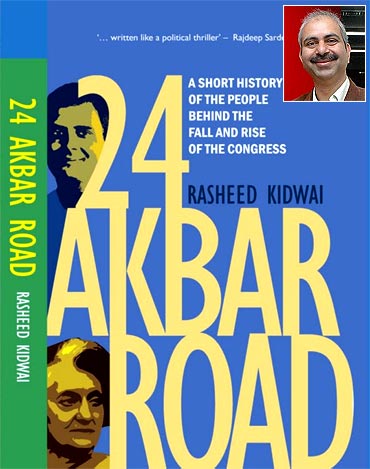
Eminent journalist and author Rasheed Kidwai recently launched his second book, 24, Akbar Road, which deals with the Congress party post the Emergency period.
In this interview with rediff.com's Sahim Salim, Kidwai talks about the book, the challenges he faced while researching for it and the state of the Congress party today. Talking about party general secretaries Rahul Gandhi and Digvijaya Singh's experiments in Uttar Pradesh, Kidwai says that it is interesting, but that Rahul has to reconcile with what the Central government is offering in terms of agricultural reforms, etc.
He also talks about the lack of 'big' ideas coming from 24, Akbar Road, and opines that the party is not 'striving hard.'
Edited excerpts:
Tell us about your new book, 24, Akbar Road.
My book is basically about the Congress post the Emergency period; the players responsible for the fall and rise of the party.
It is not written from a scholarly or academic point of view, but an attempt has been made to familiarise the readers about the party. For instance, when you compare the Congress with other political parties, they are not guided by a strong ideology.
It does not mean that the Congress is ideologically neutral. Its ideologies are more in keeping with the changing times.
...
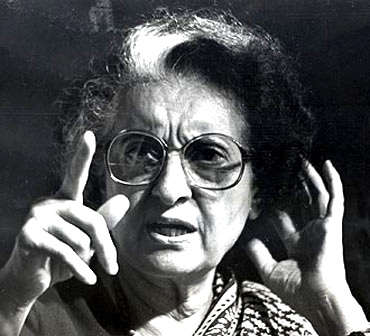
Why have you chosen the title, '24, Akbar Road'?
It was (former prime minister) Indira Gandhi who provided a lot of consolidation for the Congress party -- she had her failures and successes.
24, Akbar Road has played a very vital role in the history of the Congress party. It was this house at which, so to say, Indira Gandhi was almost finished.
It played a big role in preparing her to bounce back. Congress was out post the Boffors case in 1989. It again sort of regrouped at 24, Akbar Road.
Again Congress went out of power in 1996 because of corruption, Ayodhya and all those issues, which was fairly a long and testing time for the party. For nine years, Congress was out of power. It was again in this house that a lot of brain storming took place; planning, policy, politics. etc.
When did you first get the idea of writing the book?
I have been a political writer for a long time. It has always fascinated me how political parties function. A concrete idea for writing a proper book came in 2006 or 2007, but the fascination has always been there.
When it comes to access, the common man has much lesser access to politicians than say a bureaucrat. I thought that I should write something on Congress's internal functioning.
When I was doing the research for my earlier book on the life of Sonia Gandhi, I felt that I should write about the party. As a journalist, for about 13-14 years, I would be at 24, Akbar Road every single day at one point or another. That had given me a lot of insight into how it functions.
I have written in the book how the Congress party mirrors the Indian society. For example, all the general secretaries of the party have clean and well maintained toilets in their offices, but visitors have broken, dirty toilets. This somehow reflects the Indian society.
As another example, Congress is considered the architect of information technology revolution. Yet, the party work is not done through e-mails, most of it takes place on paper, much like the Indian society.
Attendance is another major problem at 24, Akbar Road. There is a 'sab chalta hain' attitude at the Congress headquarters.
I wanted these details about the party known -- the internal functioning of the party.

Since your book deals with the post Emergency period of Congress party, it would have been difficult not to draw a comparison between Sonia Gandhi and Indira Gandhi.
See, it was Indira Gandhi who got back to back victory in 1967 and 1971. So to speak, Sonia Gandhi has equaled that.
People familiar with Indian politics will know that politics is much more complex today than what it was in Indira Gandhi's time. Sonia Gandhi is not the daughter of Jawaharlal Nehru, inspite of which she managed that feat.
Commentators will say that she does not even come near Indira Gandhi in politics. But, I say that the twin victories under Sonia Gandhi are no less significant.
Tell about the road blocks you hit during your research. Which part of the book was most difficult to research?
I think the most difficult part was access. You see, though we are very much influenced by the West, when it comes to transparency of public figures, we are very conservative.
The culture of writing on contemporary politics is not there here and therefore access to research on the party is limited.
24, Akbar Road does not have a well equipped library. There was no reference material. Party workers are not very forthcoming with information. I have no grudges against Congress party members. I talked to them without them being aware that I would be writing a book and they gave me a lot of insight.
There was no cooperation to talk about the party's functioning, but I did not really receive any kind of deterrent in my book. I received no threats or advice not to write the book.
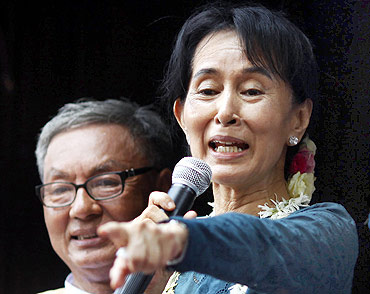
Personally, which part of your research fascinated you the most?
I was reading the biography of (Nobel laureate Burmese politician) Aung San Suu Kyi and I came to know that she had stayed at 24, Akbar Road. This was fascinating.
There are a lot of swanky cars today at 24, Akbar Road. It is a very resourceful today. But there was a time, post emergency, that party members did not have money to even have food.
In 1977, Congress was wiped out in north and western India. When somebody would come from south, Buta Singh would take money from them for food, etc. Using his contacts, he would request taxi drivers to bring in their cars.
Many times, because of Buta's charms, they did not have to pay. Ghulam Nabi Azad did not have much money and he would just have banana and bread. These stories were fascinating.
When you look at it, the Congress party seems to have no political ideology. Is that true?
Yes, that is true. I believe that is the beauty of the party. Jawaharlal Nehru had once written to Rafi Ahmed Kidwai saying that differences are a very integral part.
Another example, there was an issue of Dhanbad, which was part of Bengal. So, the West Bengal Congress had a view and the All India Congress Committee had a different view.
These views were expressed at the floor of the Lok Sabha. Sonia Gandhi herself said in 1998 that differences are unavoidable, but desirable. This needs to be remembered, because there will be differences within a party.
Not everybody in the Congress party was comfortable with liberalisation. Vyalar Ravi, AK Anthony, etc. had raised objections to Manmohan Singh's reforms.
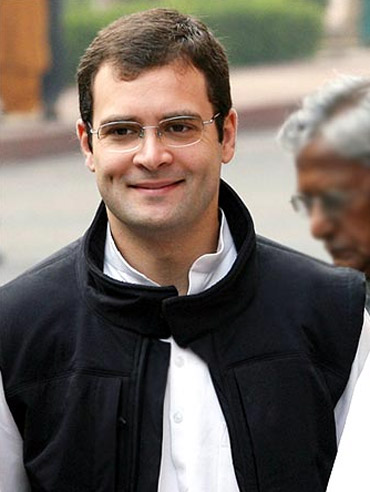
How important was the Emergency period in the party's history? How did that period shape up the politics of the party?
Other than the assassinations of Mahatma Gandhi, Indira Gandhi and Rajiv Gandhi, I think the Emergency period was the most important moment in the history of Congress.
It was a very fascinating period too. It saw a lot of trial and error on the part of Indira Gandhi. It prominently figures in my book. I think Emergency strengthened our democracy. It taught the society including political parties, media and office bearers the importance of free speech.
Emergency also threw some good leaders. Post Emergency, many leaders left the party, but many new ones came in too.
People who became part of the Congress during that period are the ones calling the shots today. Ambika Soni, Ahmad Patel, Ghulam Nabi Azad, Vyalar Ravi, Oscar Fernandez, Ashok Gehlot, Digvijaya Singh, etc, began their careers about that time.
It is difficult to not talk about dynasty politics while talking about the Congress party. How has the party maintained a seemingly professional ideology, while keeping the reigns of control within the family?
I think it is not something that is a part of a pre-written script. I mean, look at Sonia Gandhi. She met Rajiv Gandhi without even knowing who he was.
Our politics is very complicated. I feel that dynasty politics cannot be done with a script. In all political parties, including the Left parties, there are second generation politicians. I don't feel very agitated about this.
I would have a problem if these things worked on nominations. But if they are winning elections and coming, then what is the problem? If they are being accounted for in a democratic sense, I don't see a problem.
In any case, second generation politicians is not a new phenomenon. In middle class families, a doctor's son becomes a doctor, an engineer's son becomes an engineer, etc. Same with politics. I know it gives them an undue advantage, because the son of a minister does not need an introduction.
But you cannot hold this against that son! Hillary Clinton has benefitted from Bill Clinton's career, but that does not take away her democratic right to enter a political contest. I think she has done a wonderful job.
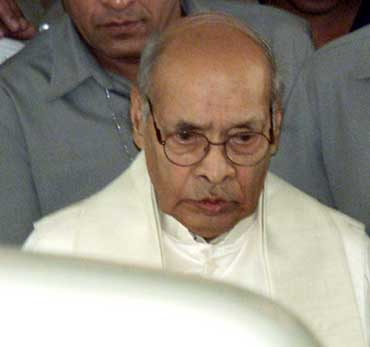
Congress, as a party, has ignored the legacy of Narasimha Rao. Do you think he was a victim of dynasty politics?
I wouldn't say he was a victim of dynasty politics, if at all, he was a victim of inaction. Rao is a very fascinating person. He had a lot of lows and highs in his life. He spoke very little, but he was very well informed.
He quietly strategised his areas and he benefitted from it. I agree he did not have a glorious political ending, but that is part of politics.
Can you draw out a brief comparison between Rahul and Rajiv Gandhi as young politicians? In your opinion, how much did the expectations out of him mould Rahul as a politician?
I think any comparison is very unfair. Rajiv had benefitted a lot because of his grooming by Indira Gandhi. Both he and Sanjay were brought up to be leaders.
Sonia groomed Rahul in a very different way. He has not been very successful, but Rahul's motto seems to be first desire then deserve. Rajiv Gandhi was flying Air India flights, married with two children and was seen as a mature man.
Rahul, on the other hand, has this image of being a boy. Rahul is over 40, but Rajiv Gandhi became PM at 37. Rajiv was in a hurry, which proved beneficial and disastrous at different times. Rahul, in that way, is very 'wait and watch.' Temperamentally, they are different.
In the Congress party, Rahul came from nowhere. Congress members were expecting Priyanka Gandhi to enter politics. But it was Sonia and the Gandhi family's collective judgment to bring in Rahul. He has arrived, in my opinion.
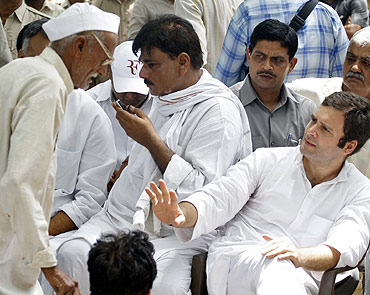
Talking about the elections in UP, do you think Rahul Gandhi and Digvijaya Singh's experiments will help Congress to reclaim the state?
Digvijaya and Rahul are experimenting a lot in Uttar Pradesh. I do think that Digvijaya Singh's announcements did have an impact on the election results in Tamil Nadu and Kerala.
People talk about vote-bank politics being used by these two, but I say every party indulges in it. I think it is interesting what Digvijaya and Rahul are doing in Uttar Pradesh. I call it 'M-K' -- Muslims-Kisan. Kisan does not have a kind of identity -- there are Brahmins kisans, OBC kisans, etc.
I think, however, Rahul Gandhi has to reconcile with what the Central government is offering in terms of agricultural reforms etc. There is a gulf between what Rahul is professing in UP and what the Central government is doing.
What about 24, Akbar Road, the party high command? Are the ideas coming from there going to help in the state?
See that is another thing. There are no big ideas coming from 24, Akbar Road. It is becoming an office -- there are spokespersons and statements are issued, but no real 'big ideas' are coming from there. There is a problem in even attendance there!
There are no follow ups to AIICC meetings. Chief Ministers' conclave does not happen anymore. They are not striving hard.
They talked about aam-aadmi in 2004 and 2009. But there is price rise, prices of petroleum is going high. People should be provided opportunities to tide over these price rises.